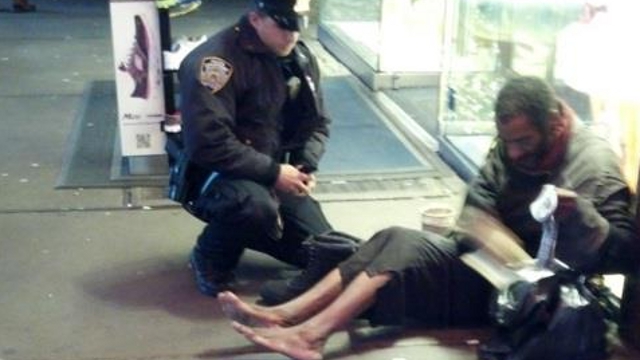New York City Leads Jump in Homeless
- Written by Admin TOA
- Published in Politicians
 An average of more than 50,000 people slept each night in New York City's homeless shelters for the first time in January, a record that underscores an unsettling national trend: a rising number of families without permanent housing. New York City's homeless population reached a record 50,000 reported individuals in January, and is indicative of a troubling national trend. Michael Howard Saul explains. Photo: Getty Images. Families have become a larger share of the nation's homeless population, growing 1.4% from 2011 to 2012, after their numbers fell as the economy emerged from recession.
An average of more than 50,000 people slept each night in New York City's homeless shelters for the first time in January, a record that underscores an unsettling national trend: a rising number of families without permanent housing. New York City's homeless population reached a record 50,000 reported individuals in January, and is indicative of a troubling national trend. Michael Howard Saul explains. Photo: Getty Images. Families have become a larger share of the nation's homeless population, growing 1.4% from 2011 to 2012, after their numbers fell as the economy emerged from recession.In Boston, authorities said there were 1,166 homeless families in December 2012, up 7.8% from the previous year. In Washington, D.C., homeless families grew 18% from 2011 to 2012, according to the U.S. Department of Housing and Urban Development.
The numbers in New York, however, are starker, according to a report to be published Tuesday by the Coalition for the Homeless, a New York advocacy group, citing New York City government figures.
More than 21,000 children—an unprecedented 1% of the city's youth—slept each night in a city shelter in January, an increase of 22% in the past year, the report said, while homeless families now spend more than a year in a shelter, on average, for the first time since 1987. In January, an average of 11,984 homeless families slept in shelters each night, a rise of 18% from a year earlier.
"New York is facing a homeless crisis worse than any time since the Great Depression," said Mary Brosnahan, president of the Coalition for the Homeless.
Yolanda Walker, a 42-year-old mother of four, is living with her family at a homeless shelter in Brooklyn, N.Y.
State and local governments nationwide have struggled to accommodate a homeless population that has changed, including large numbers of families with young children. Homeless advocates said the Obama administration has focused on more visible problems, such as those sleeping on the streets, taking resources away from families. Department of Housing and Urban Development officials, who oversee federal homelessness programs, didn't respond to requests for comment.
New York City has seen one of the steepest increases in homeless families in the past decade, advocates said, growing 73% since 2002. The surge was accelerated by the financial crisis and mortgage meltdown, which put many lower-middle class families out of their homes, economists have said. And even though New York City has regained all the jobs it lost in the recession, economists have said they are lower-paying ones.
The steep rise has reignited questions about whether New York's economic turnaround of the past two decades has helped the city's poorest residents. Aides to Mayor Michael Bloomberg, an independent whose three terms have seen big increases in homelessness, partially blamed the surge on the economy.
"The economy is nowhere near where it was," said Seth Diamond, commissioner of the city's Department of Homeless Services. He pointed to the end of a state-funded program that subsidized rent for people leaving shelters, which ended in spring 2011; homeless families have gone up 35% since, according to shelter records.
However, Mr. Diamond said fewer homeless families are applying to enter the shelter system now than they were two years ago. He said the city was working to find employment for the homeless, "a long-term solution."
Advocates say the city's problems predate the end of the rent-subsidy program. Patrick Markee, a senior policy analyst at the New York coalition, said Mr. Bloomberg's administration in 2005 ended a policy that had been working since the 1990s, in which the city allocated a share of federal public-housing apartments and federal housing vouchers to homeless families.
Among New York City's homeless families are Yolanda Walker, 42 years old, and her four children, including a disabled daughter. They have lived in a two-bedroom unit in a Brooklyn shelter since she lost an apartment that was government-subsidized up until last year. "I couldn't hardly afford it back then," Ms. Walker said. "I'm trying to get out. But I've got a family to feed."
(By MICHAEL HOWARD SAUL, Josh Dawsey contributed to this article - Wall Street Journal)
Last modified onSaturday, 06 May 2017 10:07
Tagged under
Latest from Admin TOA
- 300 migrants to be housed at shuttered Catholic church on Northwest Side in Chicago
- Turkish Stand-Up Sensation Hasan Can Kaya Embarks on U.S. Tour with Art Evi Production, in212 Production, and TAAS New York
- "Lean Startup, To Lean Company, To Rich Exit" by Dr. Kenan Sahin is released with Forbes Books
- LOSEV USA Ramadan Campaign Let the Children Heal First with Your Ramadan Donations
- Azerbaijan Society of America Honors Centennial Anniversary of the Great Azerbaijani Politician the National Leader of Azerbaijan President Heydar Aliyev
